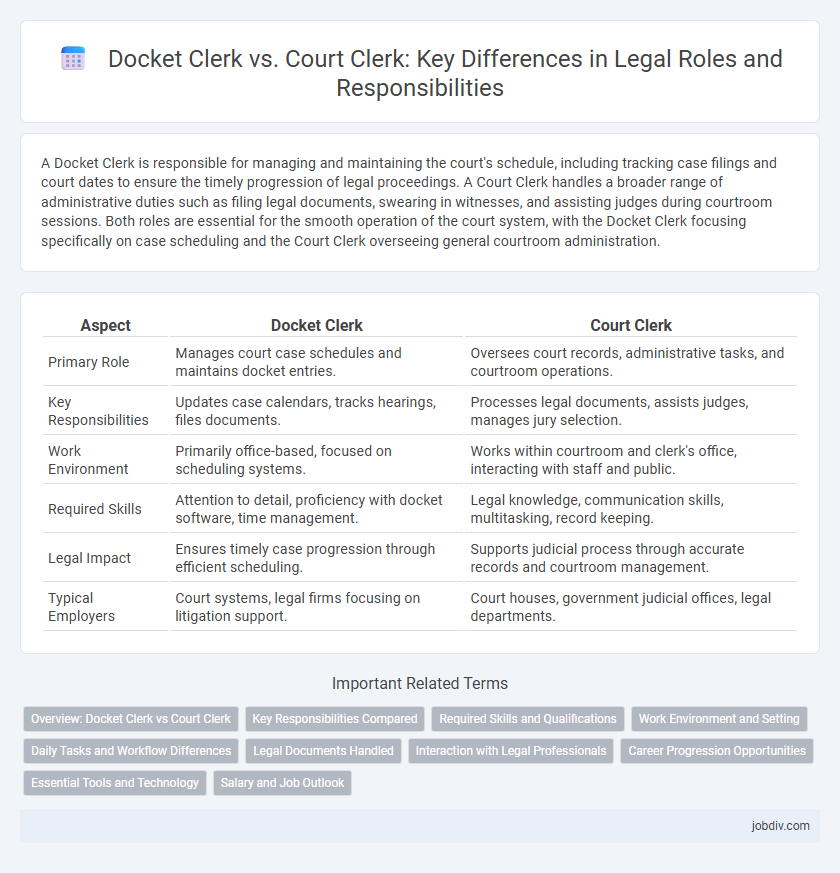A Docket Clerk is responsible for managing and maintaining the court's schedule, including tracking case filings and court dates to ensure the timely progression of legal proceedings. A Court Clerk handles a broader range of administrative duties such as filing legal documents, swearing in witnesses, and assisting judges during courtroom sessions. Both roles are essential for the smooth operation of the court system, with the Docket Clerk focusing specifically on case scheduling and the Court Clerk overseeing general courtroom administration.
Table of Comparison
| Aspect | Docket Clerk | Court Clerk |
|---|---|---|
| Primary Role | Manages court case schedules and maintains docket entries. | Oversees court records, administrative tasks, and courtroom operations. |
| Key Responsibilities | Updates case calendars, tracks hearings, files documents. | Processes legal documents, assists judges, manages jury selection. |
| Work Environment | Primarily office-based, focused on scheduling systems. | Works within courtroom and clerk's office, interacting with staff and public. |
| Required Skills | Attention to detail, proficiency with docket software, time management. | Legal knowledge, communication skills, multitasking, record keeping. |
| Legal Impact | Ensures timely case progression through efficient scheduling. | Supports judicial process through accurate records and courtroom management. |
| Typical Employers | Court systems, legal firms focusing on litigation support. | Court houses, government judicial offices, legal departments. |
Overview: Docket Clerk vs Court Clerk
Docket Clerks specialize in managing and maintaining court case schedules, ensuring accurate recording of case progress and hearing dates within court management systems. Court Clerks have broader responsibilities, including administrative support, document handling, and coordinating courtroom activities such as swearing in witnesses and managing evidence. Both roles are essential in courtroom operations but differ primarily in scope, with Docket Clerks focusing specifically on case docket management and Court Clerks overseeing overall court procedures and logistics.
Key Responsibilities Compared
Docket clerks manage and maintain court schedules by organizing case files, recording case progress, and ensuring timely updates of hearing dates. Court clerks handle administrative duties such as processing legal documents, managing courtroom logistics, and assisting judges with documentation and communication. Both roles are essential for efficient court operations but differ in focus, with docket clerks prioritizing scheduling and case tracking, while court clerks emphasize administrative and procedural support.
Required Skills and Qualifications
Docket Clerks require strong organizational skills, attention to detail, and familiarity with case management software to accurately track court schedules and filings. Court Clerks must possess a comprehensive understanding of legal procedures, excellent communication abilities, and proficiency in document preparation to assist judges and manage courtroom activities efficiently. Both roles typically require a high school diploma or equivalent, with preference for candidates holding certifications in court administration or legal studies.
Work Environment and Setting
Docket clerks primarily work within courtrooms or legal offices, managing case schedules, filings, and documentation in high-pressure environments that demand accuracy and adherence to strict deadlines. Court clerks operate in more diverse settings, including administrative offices and courtrooms, where they handle courtroom proceedings, maintain official records, and assist judges in managing trial logistics. Both positions require familiarity with legal protocols, but docket clerks are more focused on case flow, whereas court clerks engage directly with courtroom operations and public interactions.
Daily Tasks and Workflow Differences
Docket clerks primarily manage and update case schedules, ensuring court calendars are accurate and all filings are correctly recorded, which facilitates smooth court proceedings. Court clerks handle a broader range of administrative tasks including processing legal documents, managing court records, and assisting judges during trials. The workflow of docket clerks centers on tracking case progress and deadlines, while court clerks support courtroom operations and maintain overall court administration.
Legal Documents Handled
Docket clerks primarily manage the chronological record of all proceedings and filings in a court case, ensuring legal documents such as pleadings, motions, and orders are accurately entered into the docket system. Court clerks handle a broader range of legal documents, including subpoenas, jury summonses, and official court transcripts, facilitating the overall administrative operations within the courtroom. Both roles require meticulous attention to detail to maintain the integrity and accessibility of critical court records.
Interaction with Legal Professionals
Docket Clerks manage case schedules, ensuring accurate tracking of court dates and deadlines, which facilitates timely communication with attorneys and judges. Court Clerks handle a broader range of administrative tasks, including maintaining official records and assisting judges during proceedings, thus supporting the workflow of legal professionals. Both roles require precise coordination to streamline court operations and enhance collaboration with lawyers, paralegals, and judicial staff.
Career Progression Opportunities
Docket Clerks typically focus on managing court schedules and case documentation, serving as an entry point within the judicial administrative system. Court Clerks hold broader responsibilities including maintaining court records, assisting judges, and managing courtroom procedures, which often leads to more advanced career opportunities such as supervisory or administrative roles in the court system. Progression from Docket Clerk to Court Clerk is common, offering increased responsibilities, higher salaries, and potential pathways to specialized legal administrative positions.
Essential Tools and Technology
Docket clerks utilize specialized case management software to track and update case schedules, ensuring efficient docket control and deadline adherence. Court clerks rely on integrated electronic filing systems and digital record management tools to maintain accurate court documents and facilitate seamless communication between judges, attorneys, and litigants. Both roles depend heavily on secure, user-friendly platforms designed to streamline administrative workflows and uphold procedural compliance.
Salary and Job Outlook
Docket Clerks earn an average salary ranging from $30,000 to $45,000 annually, with job growth projected at 5% over the next decade, reflecting steady demand in legal administration. Court Clerks typically have a higher salary range, between $40,000 and $60,000 per year, due to broader responsibilities and often exhibit a stable employment outlook with similar growth rates around 4-6%. Both roles require strong organizational skills and familiarity with legal procedures, but Court Clerks generally enjoy better compensation and more consistent advancement opportunities.
Docket Clerk vs Court Clerk Infographic

 jobdiv.com
jobdiv.com